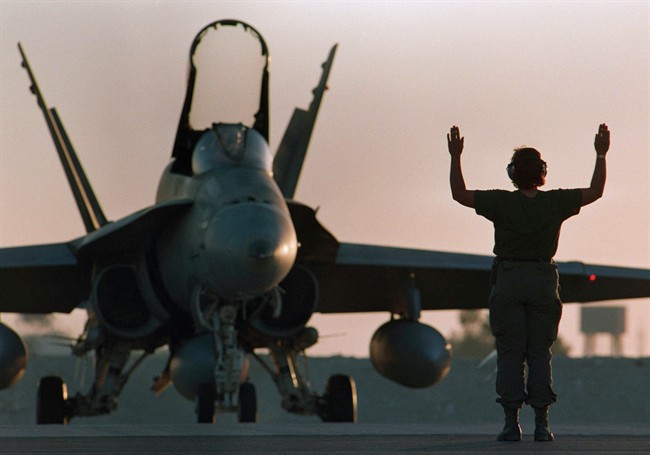Six Canadian fighter jets will operate out of Keflavik Air Base in Iceland as part of Canada’s periodical contribution to the North Atlantic Treaty Organization (NATO).

The jets will patrol Iceland’s airspace to meet and identify unknown airborne objects within or approaching the jurisdiction. The mission marks a renewal of Canada’s commitment to Operation Reassurance, announced by the Canadian government in July, 2016. About 180 Canadian Forces members are involved in the roughly month-long operation.
WATCH: Is it time to reinvest in Canada’s military?

“Canada is a committed NATO ally and our commitment to the transatlantic bond is as strong as ever. Air Task Force-Iceland is part of the renewal of the mandate of Operation Reassurance announced by the Government of Canada in July 2016 at the NATO Warsaw Summit in Poland. Canada and Iceland continue to be close partners within NATO and this deployment is an example of Canada’s continuing solidarity and collaboration with Allies to ensure safety and security in the Alliance’s airspace,” said Defence Minister Harjit Sajjan in a statement.
Operation Reassurance began in 2014 to reinforce NATO’s collective defence in Central and Eastern Europe, and Canada’s Air Forces were offered to the mission in April of 2014. The operation is also intended to ease concerns of NATO allies in the face of Russian aggression towards Ukraine.
As part of NATO’s Forward Presence group along with the United States, the United Kingdom and Germany, Canada is responsible for establishing separate NATO battle groups. Canada continues to be close partners with NATO, as evidenced by Prime Minister Justin Trudeau’s affirmation of this commitment last year.

Get breaking National news
On July 8, 2016, Trudeau announced Canada’s largest sustained military presence in Europe in over a decade with the deployment of forces in Latvia. These included a multinational NATO battle group, a frigate that would undertake operational tasks with NATO’s maritime region, and six CF-18 fighter aircraft jets for surveillance purposes.
“Canada is a playing a strong and constructive role in the world. We are ready to respond to support NATO with some of the most effective soldiers, sailors, and airmen and airwomen in the world. We will continue to work closely with our Allies and partners to create a safer and more prosperous world for everyone,” said Trudeau in a statement at the time.
Fifty Canadian combat engineers were deployed to Latvia on April 29 as part of this commitment — which also falls under Operation Reassurance — with a mission to build a town for 500 soldiers. In March, amid calls from NATO to increase military spending from Canada’s current one per cent of GDP to two per cent, the prime minister pointed to the Latvian mission as an example of Canada’s readiness to participate in NATO military initiatives.
“Canada has always been one of the handful of countries that has always been ready and capable of stepping up on important missions of participating and of punching well above their weight,” Trudeau said at a NATO summit in Brussels.
WATCH: Canada’s Defence Minister admits military is underfunded

While the Russia-NATO Founding Act of 1997, blocks NATO from seeking “additional permanent stationing of substantial ground combat forces” in the nations in close proximity to Russia, Dylan P. White, press officer for NATO, explains why Russia’s annexation of Crimea negates this clause.
“All of this is consistent with the NATO-Russia Founding Act, which states that ‘reinforcement may take place…in the event of defence against threat of aggression,'” said White in a statement.
White also says that in response to Russia’s annexation of Crimea and aggressive actions against Ukraine, NATO is reinforcing the defence of Allies in central and Eastern Europe.
Furthermore, White goes on to explain that the Act outlines principles including “refraining from the threat or use of force against each other as well as against any other state” and “respect for sovereignty, independence and territorial integrity of all states.”
Fighter jets in Iceland will begin patrolling on May 22. Following the mission to Iceland, members of the Royal Canadian Air Force will continue Operation Reassurance missions in Romania beginning in September.
— With files from The Canadian Press








Comments